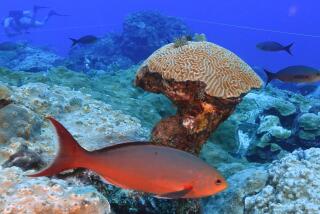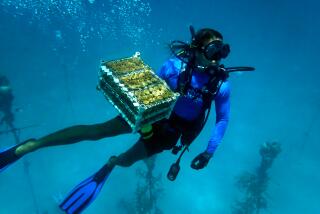Scientists shocked to find coral reef in murky waters off Iraq

Scientists shot this video of a coral reef in the coastal waters off Iraq. The researchers said they were “entirely surprised” to find it considering the “harsh conditions” in the Persian Gulf.
- Share via
Scientists have made a surprising discovery in the waters off the coast of Iraq: a coral reef made up of more than half a dozen species of the marine animals.
A team of divers from the Freiberg University of Mining and Technology in Germany and the Marine Science Center at the University of Basrah in Iraq captured video footage of the murky waters where the Shatt al-Arab river flows into the northwestern portion of the Persian Gulf. (You can watch the video above.) The river carries sediment -- and frequently oil -- into that portion of the gulf, which is often churned up by strong winds and currents.
These conditions were thought to make the waters inhospitable to coral. But it appears marine biologists had underestimated the adaptability of these invertebrate underwater creatures.
PHOTOS: Coral reef discovered off Iraqi coast
“We were entirely surprised to find living coral reef under such harsh conditions,” the research team reported Thursday in the journal Scientific Reports. “Extensive coral reefs do not typically develop under conditions where nutrient and suspended sediment concentrations are acutely or chronically very high.”
The reef they found covers an area of nearly 11 square miles and is is 23 to 65 feet beneath the surface, according to the study. The temperature and salinity of the waters there change rapidly, and visibility is low.
Among the coral species identified were stony corals like Platygyra pini, Porites lobata, Goniastrea edwardsi, Astroides calycularis and members of the Tubastrea genus (which are also known as sun corals). There were also octocorals (which look similar to stony corals but don’t have a hard skeleton), including Junceella juncea.
In addition to corals, the researchers found sponges, another type of underwater animal that lives in colonies. “To identify sponges in this marine environment was entirely surprising” because they were thought to be too delicate to live in waters with high concentrations of sediment, they wrote.
Further study of the Iraqi reefs can help scientists understand how coral and other marine species will adapt to conditions brought on by global warming, the researchers said.
“The temperature on earth is increasing and extremes are becoming more pronounced,” they wrote. “Study of these extreme reef systems becomes of vital relevance as our climate changes.… These valuable habitats urgently need protection, conservation and research.”
But the German and Iraqi scientists recognized that may be easier said than done: “This is a particular challenge [in] the gulf area due to the extensive oil and gas exploration.”
If you’re interested in the latest scientific and medical studies, you like the things I write about. Follow me on Twitter and “like” Los Angeles Times Science and Health on Facebook.







